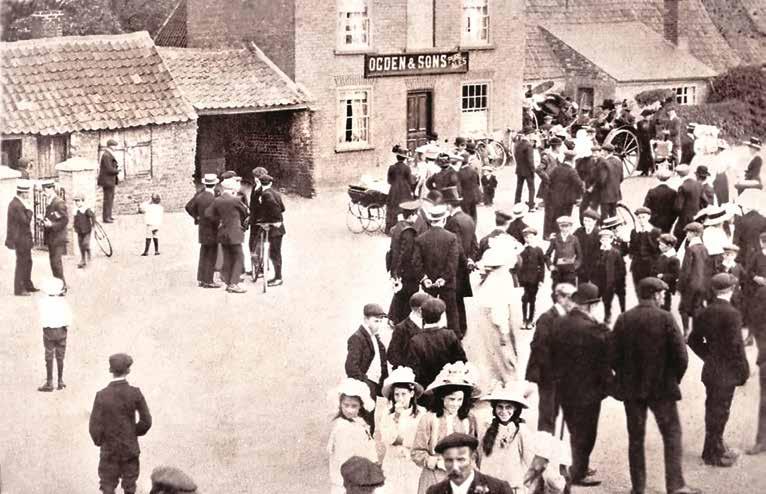
5 minute read
History: Hiring Fairs
Hiring staff in Market Deeping, the swings and roundabouts
“The Fair was now raging thick and loud. It was the chief hiring fair of the year and differed quite from the market of a few days earlier. In substance it was a whitey- brown crowd flecked with white - this being the body of labourers waiting for places. The long bonnets of the women like waggon-tilts, their cotton gowns and checked shawls mixed with the carters’ smock frocks; for they too entered into the hiring.”
Advertisement
This is how a Hiring Fair (also known as a Statute) was described by Thomas Hardy in The Mayor of Casterbridge, but similar scenes would have been seen in the Market Place here in Market Deeping. The Fairs took place in May and November and in May 1873 the Lincs Free Press reported that ’there was a large attendance of masters and mistresses seeking servants, and though there was a good number of servants the demand exceeded the supply. Extravagant wages were asked for and were given’.
On the day of the Hiring, farmers and their workers would have the day off and come into Market Deeping to spend the day meeting friends, drinking and enjoying themselves while some went to find work or workers. The Market Place was
Pictures illustrative not local.

crammed with people and stalls selling farm produce, sweets, trinkets and medicines. Farm workers were only hired for a six-month term and if the farmer did not ask them to stay then they had to find a new position. Workers who were unhappy in their job may decide to leave and they would need to be replaced.
Men and women hoping to be hired would stand around in the Market Place in twos and threes with tickets in their caps to show that they were looking for work. Farmers would wander amongst them making their choices. They would pay a fee, often a penny known as ‘arles’, to seal the deal. Horsemen could claim 2-5 shillings more than labourers as they were highly skilled, responsible for the horses that were highly valued on farms, doing the heavy work which could not be done by men. Each horseman was responsible for a pair of horses and one horseman was selected to be the most important, known as the First Horseman. Rising at 5.00 a.m. to tend the horses, they would have their own breakfast and then start work at 6, working on the fields all day, walking behind the horses and guiding them while they harrowed or ploughed the ground ready for
Words: Judy Stevens Research: Joy Baxter, Dorothea Price
sowing, or pulling the binder at harvest time. They would let the horses loose at 6.00 p.m. but at harvest time they might need to keep working as late as 8 or 9 p.m.
Women were also appointed for set terms usually to work in the kitchen, cooking and cleaning for the farmer’s family. They were kept hard at work under the watchful eye of the farmer’s wife. Living in the farmhouse, often in a little attic room, they fed the hens, milked the cows, made butter and helped the farmer’s wife to prepare the men’s food. They too worked long hours starting at 5.00 a.m. and continuing long into the evening. Young boys and girls were employed to scare the birds away from newly planted seeds.
In 1881 the annual May statutes for the hiring of servants was a lot less successful than the one reported earlier:
‘There was a larger gathering of servants of both sexes than usual, and a good deal of hiring was done. High wages were asked but much less taken from £2-£3 below the average of last year. Swinging boats in the Market Place and dancing at some of the inns were the chief amusements. The theatrical entertainment announced to take place at the White Horse rooms on the same evening met with no patronage.’



• Back and Neck pain • Frozen shoulder • Sciatica • Sports injuries • Repetitive strains, tennis elbow • Rheumatic Arthritic pain • Joint pain Nutritional therapy also offered and Chinese Acupuncture from 1st June We can help you, call us today for professional, affordable help. Tel: 01778 345223 www.deepingosteopaths.co.uk 37 Church Street, Market Deeping, PE6 8AN Are you experiencing -
Ofsted (April 2014) “Relationships are strong as a result children are happy and secure”
Free child places available for 2-3 year olds and all 4 year olds
Celebrating 25 Years of success
a.b.c Day nursery and out of school club operates from a mobile building set in 3.5 acres with a large play area. This has been thoughtfully designed to provide flexible childcare facilities for children aged 6 weeks to 13 years. Our long standing team of highly trained, enthusiastic practitioners provide a stimulating and caring environment. Our baby room, toddler room and pre-school room use the Early Years
Foundation Stage (EYFS) framework to plan activities to support children’s learning and development. We are situated in Tallington, just off the A1175 on Barholm Road.
We offer flexible hours to suit every family’s needs.

For more information contact us on: 01778 343111. email us: abcdaynurserytallington@gmail.com Website: www.abcdaynursery-tallington.co.uk Find us on Facebook. 20% discount on your first weeks fees when you enrol. Open day: Saturday 6th June 12:00pm -4:00pm
Cream Teas Thursday, Friday & Sat £2 off with this coupon for parties of 4 booking a full cream tea Expiry 30th September 2015 Reader Offer

• Private dining and corporate function rooms • Afternoon Teas by appointment • Wedding anniversaries/Receptions, Christenings and other celebrations • All functions and business meetings catered for Events Psychic night Fri 15th May Murder Mystery Eve Sat 23rd May Open Garden as part of Deeping St Nicholas Open Gardens Sun 28th June

Call us to book or for more information
TEL. 01775 630366
View our Menus for Sunday lunches on our website at www.stnicholashouse.co.uk







